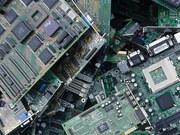 |
|||||||||||||||||||||||||||
|
| |||||||||||||||||||||||||||
|
Recycling of solder dross and solder pasteSince wave and selective soldering processes are conducted in air, there will always be some amount of metal alloy that becomes unusable due to oxidation. Solder dross refers to the byproduct generated during the soldering process. This waste material is composed of a combination of solder, which is typically made of alloys like tin and lead, along with oxidized metals and various impurities that may accumulate during soldering. The presence of dross is a common occurrence in soldering applications, particularly in the electronics and manufacturing industries. Not only does solder dross contribute to environmental waste, but it also represents a loss of valuable materials. However, it is important to note that solder dross can be recycled effectively. Through specialized processes, this waste can be reprocessed and refined to create new solder bars. These recycled solder bars can then re-enter the market, offering an economical and sustainable option for manufacturers and helping to reduce the overall waste associated with soldering. Recycling solder dross not only conserves resources but also minimizes the environmental impact of soldering operations. We provide comprehensive solder dross recycling services tailored to your needs. Whether you have lead-based or lead-free solder dross or solder paste,
our team is equipped to handle the recycling process efficiently. Most common dross today is the unleaded solder which is SN100c dross, 63/37 dross (Sn63Pb37) is still widely used in the industry, there are some uncommon solder rarely used such as Sn60Pb40, Sn50Pb50, Sn40Pb60 and Sn5Pb95, however we take all types of solder dross including other types such as SAC305 which is a mixture of Tin, Silver and copper in the following formula Sn96.5Ag3.0Cu0.5 We buy solder dross, solder paste, solder pot dumps and new virgin solder for recycling. We purchase solder for reclamation and scrap tin.It is essential to properly recycle solder waste instead of sending it to landfills. Solder and soft solder, commonly used in electronics and plumbing, typically contain tin and may also include hazardous metals such as lead, silver, and copper, along with other elements. Disposing of these materials incorrectly can lead to environmental contamination and health risks. Therefore, ensuring that solder waste is directed to appropriate recycling facilities contributes to a safer and more sustainable future. If you possess any type of solder for recycling and would like more information, we kindly request that you complete the form located
on the right-hand side of this page.
In order to assist in the evaluation process, please be prepared to provide a clear photograph of the solder upon our request.
This will enable us to assess the type and condition of the material you wish to recycle.
Types of solder for recyclingSolder paste, wipes, gloves - These are considered as Hazardous material unless
dry and proven other by a TCLP test. See more photos of solder and solder dross samples we are buying for recycling |
| |||||||||||||||||||||||||
|
BSD | |||||||||||||||||||||||||||
|
Site maintained by Inspire Sites | |||||||||||||||||||||||||||
